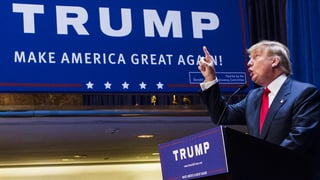
The 2016 presidential campaign of Donald Trump was formally launched on June 16, 2015, at Trump Tower in New York City. Trump was the Republican nominee for President of the United States in the 2016 election, having won the most state primaries, caucuses, and delegates at the 2016 Republican National Convention. He chose Mike Pence, the sitting governor of Indiana, as his vice presidential running mate. On November 8, 2016, Trump and Pence were elected president and vice president of the United States. Trump's populist positions in opposition to illegal immigration and various trade agreements, such as the Trans-Pacific Partnership, earned him support especially among voters who were male, white, blue-collar, working class, and those without college degrees. Many voters in the Rust Belt, who gave Trump the electoral votes needed to win the presidency, switched from supporting Bernie Sanders to Trump after Hillary Clinton won the Democratic nomination. Many of Trump's remarks were controversial and helped his campaign garner extensive coverage by the mainstream media, trending topics, and social media. Trump's campaign rallies attracted large crowds as well as public controversy. Some of the events were marked by incidents of violence between Trump supporters and protesters, mistreatment of some journalists, and disruption by a large group of protesters who effectively shut down a major rally in Chicago. Trump himself was accused of inciting violence at his rallies. Trump's disdain for political correctness was a staple theme of his campaign and proved popular among his supporters. Many, including some mainstream commentators and some prominent Republicans, viewed him as appealing to racism, a charge that Trump has repeatedly denied. Trump's most polarizing and widely reported proposals were about issues of immigration and border security, especially his proposed deportation of all illegal immigrants, the proposed construction of a substantial wall on the Mexico–United States border at Mexican expense, his characterizations of many illegal Mexican immigrants as "criminals, drug dealers, rapists, etc", and a temporary ban on foreign Muslims entering the U.S. After considerable backlash, he later modified the "Trump travel ban" to apply to people originating from countries which he described as having a history of terrorism against the United States or its allies. This was also criticized for excluding countries which the U.S. has significant financial ties with, such as Saudi Arabia. Opposition to Trump grew during his campaign among both Republicans (who viewed Trump as irrevocably damaging to the party and its chances of winning elections during and after 2016, leading to the coalescence of the Stop Trump movement) and Democrats (who decried Trump's anti-immigrant and anti-Muslim policies, his behavior toward critics, his treatment of the media, and his support from the ethno-nationalist alt-right). Although some prominent Republican leaders declined to endorse Trump after he won the Republican nomination, many Republican congress-members showed support for Trump and his policy positions despite major personal or political conflicts with him. Some such supporters of Trump's campaign were accused, by both conservatives and liberals, of prioritizing party loyalty and avoiding alienation of Trump supporters to ensure re-election, thereby refraining from condemning Trump's actions. On January 6, 2017, the United States government's intelligence agencies concluded that the Russian government interfered in the 2016 United States elections against the campaign of Hillary Clinton and in support of Trump. As president, Trump repeatedly rejected the conclusions of the U.S. intelligence agencies. From Wikipedia
